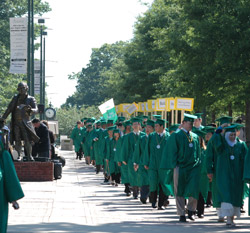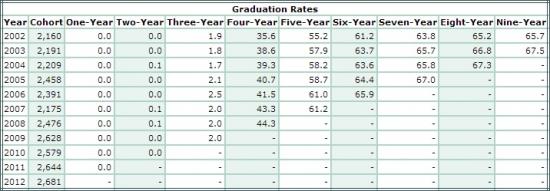Super seniors take their time as undergrads
 |
| GMU is also one of the few universities that deal with many nontraditional students, including those who have their own families and full time jobs nearby to the university (photo courtesy of George Mason University Events Management). |
Super Seniors often warn against taking time off from finishing their degree as it can lead to lack of motivation when pursuing their education years later.
It turns out living in the fast lane isn’t actually that fast.
Sarah Kersey spends her mornings, five days a week, in Northern Virginia traffic as she makes her 30-minute daily drive from her home in Sterling to her job at Inova Fairfax Hospital. After a long Monday at work, she heads, work uniform still on, to her 4:30 p.m. Biology 104 lab at George Mason University. Monday and Thursday nights are dedicated to night classes as she struggles as a part-time student to finish her 14th semester as an undergraduate.
"It's hard to see the light at the end of the tunnel sometimes when you're going part time because it does go so slowly," Kersey said.
Kersey, like many college students nationwide, is traveling the longer route to graduation. Whether tuition expenses, job commitments or personal issues are the cause, college students are reconsidering graduating in the traditional four years. Students are prone to going to school part time in hopes of prioritizing outside issues. However, in becoming part-time students, they often face dilemmas as super seniors by taking five or more years to complete their undergraduate degrees.
“I think you lose a certain amount of motivation when you don't come to school every day,” Kersey said. “When I went part time, it wasn't my main priority like it was when I was going full time.”
Lack of motivation and prioritizing haven’t been the only setbacks students face when deciding to go part-time.
“I would say the setbacks are just seeing your friends graduate before you and sometimes being upset with yourself because you didn’t get it done on time,” said Tomas Rios, a part-time student at Mason.
GMU is also one of the few universities that deal with many nontraditional students, including those who have their own families and full time jobs nearby to the university.
“If they’re working full time and they have family and they’re just not able to take a full course load, it will be in their better interest to take it a little slow,” said Melitta Igwe, an academic advisor on campus, “so that they’re doing well academically, so that they’re getting great grades versus forcing them to take several classes so that they can complete [school] a little bit faster.”
 |
| From 2002 to 2008, the number of freshman to graduate within their first four years increased from 35.6 percent to 44.3 percent (graph courtesy of George Mason University Institutional Research and Reporting). |
Although super seniors may stumble upon impediments, they try to find the light in the situation by looking at the bright, more positive side.
“I’ve pretty much worked almost the entire time I've been in school so it’s been beneficial,” Rios said. “I have been able to keep money in my pocket and gain work experience that I wouldn't have had the chance to get if I was always in school full time.”
Work experience is a huge benefit to undergraduates because it can add value to any resume.
“I've been able to establish myself in my position and become an asset, and when I graduate, my degree will be just one more thing to make me valuable instead of looking for a job after graduation with little or no work experience in my field,” Kersey said.
Both Rios and Kersey agree that the decision to become a part-time student is a personal one to make dependent on each situation.
“I think every situation is different and only you know what's right for you, so I wouldn't council someone one way or the other,” Kersey said. “It really is a personal decision.”
